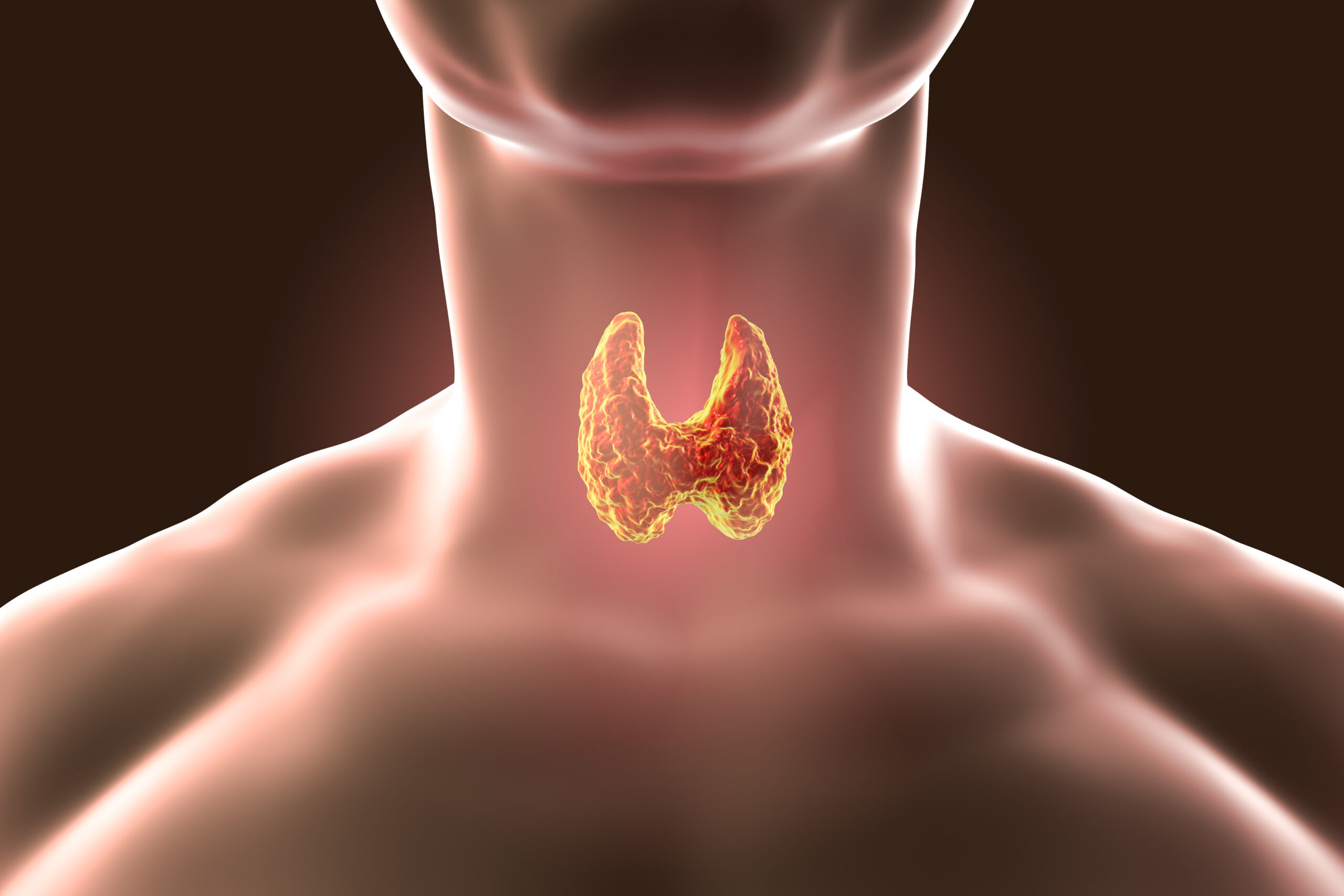
If you’re not already aware, the thyroid is a small, butterfly-shaped, gland in your neck, which produces key hormones that can affect your heart rate and body temperature, among other things. It can therefore be extremely troublesome if your thyroid isn’t functioning properly. An estimated one in twenty people in the UK have a thyroid disorder, with women being six times more likely to suffer from hyperthyroidism than men.
“Thyroid dysfunction can be a really difficult disorder to diagnose, because so many of the symptoms are either dismissable as just the after-effects of a busy life, or can be confused for symptoms of something else. It’s important to consider everything if you come for a consultation – if something feels off, don’t feel embarrassed about mentioning it, we always want a comprehensive picture of a patient’s health to start with”.
Doctor Haleema Sheikh, specialist in BHRT therapy and Functional Medicine.
In this blog, we hope to provide you with a comprehensive understanding of the different symptoms of thyroid dysfunction and the effect they can have on an individual. Integral to this is an understanding of the difference between the two main types of thyroid dysfunction, hyperthyroidism and hypothyroidism, as the symptoms for each differ. We will also explain how bioidentical hormone replacement therapy can be used to treat the symptoms in both cases.
Hypothyroidism:
More common than hyperthyroidism, hypothyroidism is a condition where the thyroid gland is underactive, and unable to produce the level of thyroid hormones that the body needs. Symptoms of hypothyroidism may develop over several years, and can also be difficult to spot in isolation. Here are some of the key signs that suggest you may be suffering from an underactive thyroid…
- Insufficient thyroid hormones can sometimes result in pain or numbness in your hands and fingers (sometimes misdiagnosed as carpal tunnel syndrome).
- For some women, a symptom of thyroid dysfunction can be irregular or heavy periods. If you notice a drastic change and inexplicable change in your menstrual cycle, don’t feel embarrassed about reaching out for help.
- Symptoms of thyroid dysfunction can also differ depending on your age – elderly people may develop memory issues or depression, whereas children might experience slower growth.
- If undiagnosed for a few years, symptoms of hypothyroidism can develop and become even harder to spot: a lower pitched or hoarse voice, hearing loss, and a puffy face are all signs of potential hypothyroidism.
There are of course many other symptoms of hypothyroidism to go along with these, such as fatigue, weight gain, constipation, muscle cramps, sensitivity to cold, or brittle hair and nails.
If some of these symptoms sound familiar to you, or are regularly affecting your life, it is important that you book a consultation with a specialist.
Hyperthyroidism:
Hyperthyroidism is a condition where the thyroid is overactive and produces too many hormones. Similarly to hypothyroidism, there often aren’t many clear indicators of a hormone problem, and it may be mistaken for other issues.
- Hyperthyroidism can cause mood swings, nervousness, anxiety and irritability. Mood changes can be caused by many different things, and aren’t always indicative of a long term health issue, but if you’re suffering from mood changes along with other symptoms on these lists, it’s worth having a conversation with a specialist!
- Hyperactivity is another symptom of an overactive thyroid – you might find that you have a lot of nervous energy, or that it’s difficult to stay still.
- There are also some physical symptoms that can be suggestive of an overactive thyroid. You may experience raised, itchy hives, or weight loss (even though many report an increased appetite), or, surprisingly, eye problems! Many patients have reported redness, dryness, and vision problems (this is often due to Graves Disease, which can cause hyperthyroidism).
Other symptoms of hyperthyroidism can include insomnia, a sensitivity to heat, stomach problems such as diarrhoea, general itchiness, muscle weakness, and perhaps one of the most obvious a swollen thyroid gland (in your neck, in case you weren’t sure).
Overlapping Symptoms:
Some of the symptoms of thyroid dysfunction are shared between hyperthyroidism and hypothyroidism – for example, fatigue or persistent tiredness, as well as loss of libido (sex drive) are common to both disorders. These symptoms by themselves may not necessarily indicate thyroid dysfunction, as obviously there are a whole range of potential reasons. However, if you feel that those two symptoms apply to you, as well as any of the others from the lists below, it’s worth making an appointment for a consultation.
Because the symptoms of thyroid dysfunction can also be symptomatic of other issues, we are deliberately highlighting some of the more unusual symptoms – our BHRT treatment process can help alleviate all of these symptoms, so if you’re struggling with them, please do get in touch with us.
BHRT Treatment for a Dysfunctional Thyroid:
Bioidentical Hormone Replacement Therapy (known as BHRT) is the use of hormones that are identical on a molecular level to the hormones that you naturally produce. In the case of thyroid disorders it is a treatment that can prove extremely effective in restoring hormonal balance, thus remedying many of the symptoms associated with thyroid dysfunction.
As the UK’s leading BHRT clinic, we have years of experience supporting individuals suffering from thyroid dysfunction. As thyroid issues are often difficult to spot with standard screening, we will carry out thorough tests in order to get a full picture of a patient’s health. We will then supplement them with either thyroid support nutrients, or by prescribing low-doses of thyroid hormones (or a combination, in some cases). By providing such a bespoke and comprehensive treatment plan, we can improve the symptoms of thyroid dysfunction, and improve the life of someone suffering with it!
If you’re struggling with some of the symptoms we have described in this article, we’d urge you to get in touch. One of our renowned hormone specialists will determine the cause of your symptoms, and provide a bespoke treatment plan to get you back to feeling like yourself.




